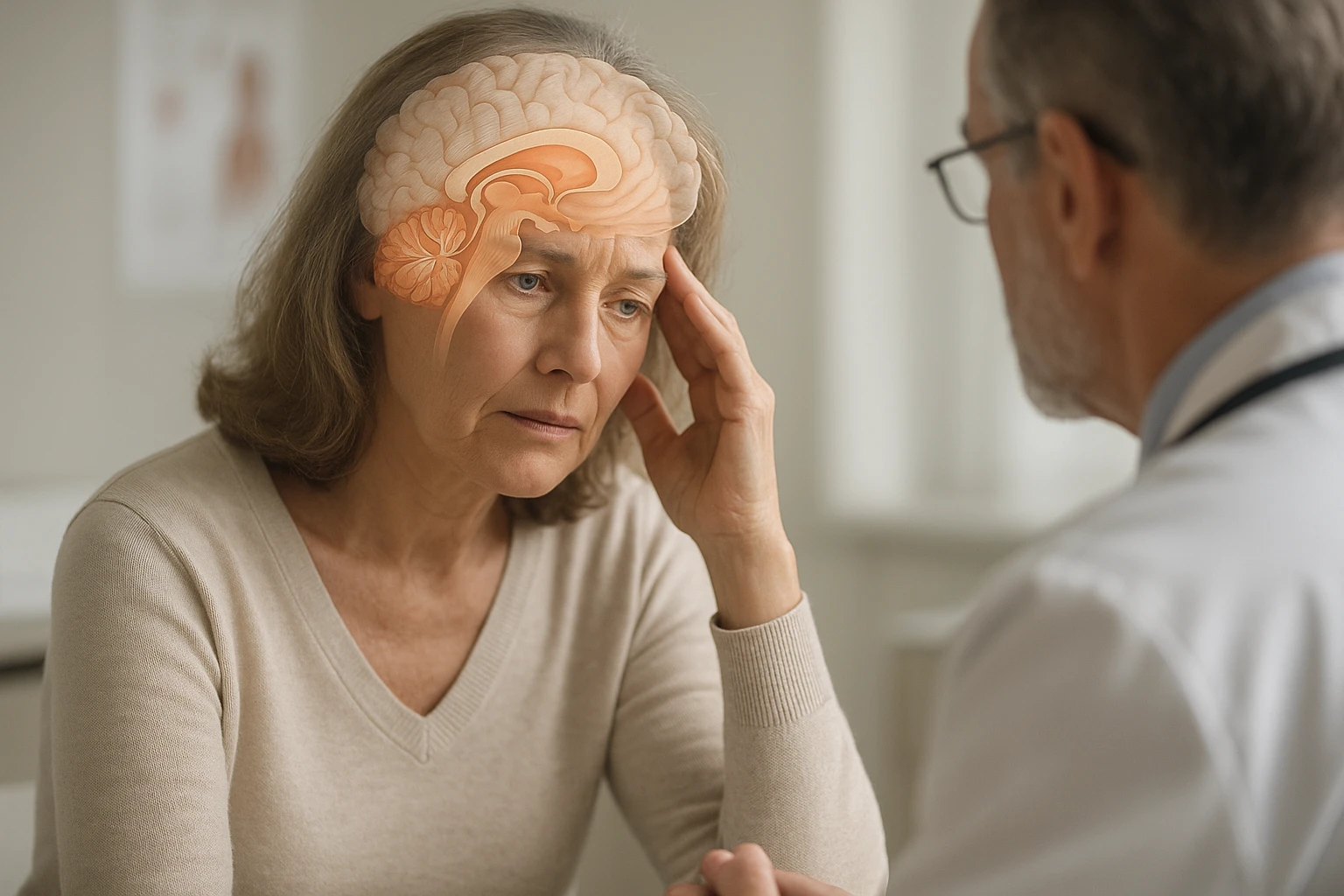Memory Loss and Aging: When to Seek Medical Evaluation
Memory Loss: Clinical Significance and Mechanisms
Defining Memory Loss
Memory loss is a clinical symptom that encompasses a wide spectrum of severity, ranging from benign lapses in recall to profound impairments associated with dementia. It reflects disruption in the brain’s ability to encode, store, or retrieve information and may result from transient physiological factors or chronic disease processes. Recognizing that memory loss is a symptom rather than a diagnosis is critical, as it may signal reversible conditions or early neurodegeneration.
Early evaluation of memory concerns is essential because timely identification of underlying causes-such as metabolic, psychiatric, or neurodegenerative disorders-enables appropriate management and may prevent further decline. Understanding the context and pattern of memory loss helps clinicians establish accurate differential diagnoses and informed intervention plans.
Phenotypes of Impairment
Memory impairment can be categorized into distinct phenotypes that differ in mechanism and prognosis:
- Normal aging: Mild slowing in information retrieval and reduced attention, with preserved overall functional ability.
- Mild cognitive impairment (MCI): Measurable deficits that exceed expected age-related changes but do not significantly affect daily living.
- Dementia: Persistent decline in multiple cognitive domains that interferes with independence and safety.
Distinguishing these patterns helps determine whether memory loss reflects normal aging or underlying pathology. Functional assessment and longitudinal monitoring are essential for identifying progression and guiding diagnostic workup.
Neurobiological Foundations
Memory function depends on a network of interconnected brain regions, including the hippocampus, amygdala, and prefrontal cortex. The hippocampus consolidates new memories, the prefrontal cortex manages retrieval and executive functions, and the amygdala attaches emotional significance to experiences. These systems interact to sustain learning and recall.
Pathological memory loss often results from neuronal injury and oxidative stress disrupting these connections. Abnormal protein accumulation, such as amyloid and tau, further damages neural communication, contributing to progressive cognitive decline.
Etiologic Patterns and Differential Diagnosis
Neurodegenerative and Vascular Causes
Chronic or progressive memory loss most commonly arises from neurodegenerative diseases that compromise brain structure and function. Alzheimer’s disease is the leading cause, marked by gradual deterioration of short-term recall and executive function. Other dementias, including Lewy body and frontotemporal types, exhibit distinct behavioral or language features but share the hallmark of neuronal loss. Vascular cognitive impairment results from ischemic or hemorrhagic injury that disrupts blood flow and damages memory networks.
- Neurodegenerative causes: Alzheimer’s disease, Lewy body dementia, frontotemporal degeneration.
- Vascular causes: Cognitive impairment secondary to ischemic or hemorrhagic injury.
Distinguishing neurodegenerative from vascular etiologies is essential because their progression, imaging findings, and management differ. Degenerative diseases usually advance slowly, whereas vascular causes may show stepwise decline or abrupt onset after cerebrovascular events. Understanding these distinctions guides targeted diagnostics and treatment.
Reversible and Secondary Causes
Not all memory loss is irreversible. Several reversible conditions can mimic early dementia, and timely recognition can significantly improve prognosis. Endocrine and metabolic disorders such as hypothyroidism and vitamin B12 deficiency are common, and correcting these issues can restore cognitive function. Psychiatric disorders, particularly depression, may also present with cognitive symptoms resembling dementia, sometimes called pseudodementia.
- Metabolic and endocrine: Hypothyroidism, vitamin B12 deficiency.
- Psychiatric: Depression-related cognitive impairment.
- Medication-induced: Sedatives, anticholinergics, and cardiovascular agents.
Comprehensive medication review and laboratory testing are key. Identifying and managing reversible causes remain the primary goal when evaluating new memory complaints.
When to Refer Urgently
While many causes of memory loss progress slowly, certain presentations warrant immediate attention. Rapidly worsening memory, sudden confusion, or loss of independence may indicate acute neurological or metabolic disturbance. New focal neurological deficits, behavioral change, or safety concerns such as wandering require urgent assessment.
- Rapid progression of memory decline
- New neurological symptoms or confusion
- Loss of independence or safety risks
- Head trauma or systemic illness with cognitive effects
Prompt differentiation between reversible and progressive causes improves outcomes and supports timely initiation of treatment and care planning.
Diagnostic Approach and Use of Biomarkers
Initial Assessment and Cognitive Testing
The diagnostic process for memory loss begins with a detailed history and cognitive evaluation. Clinicians determine symptom onset, duration, and type of memory affected while reviewing comorbidities, medications, and psychosocial factors to identify reversible causes. Input from caregivers helps document functional changes in daily life.
- Assess symptom onset, duration, and type of impairment
- Review comorbidities, medications, and psychosocial context
- Obtain caregiver input for functional assessment
Standardized cognitive tests quantify deficits in attention, recall, and visuospatial skills, distinguishing normal aging, mild cognitive impairment, and dementia. These results form a baseline for monitoring progression and treatment response.
Laboratory and Imaging Tools
Laboratory tests rule out metabolic and systemic contributors, including thyroid dysfunction and vitamin B12 deficiency. If these are normal, neuroimaging helps detect structural or functional brain changes. MRI identifies cortical atrophy or infarcts, while FDG-PET and amyloid PET visualize metabolic and molecular alterations associated with neurodegenerative disorders.
| Diagnostic Tool | Purpose | Key Finding |
|---|---|---|
| MRI | Structural imaging | Detects cortical atrophy or infarcts |
| FDG-PET | Functional imaging | Reveals metabolic deficits |
| Amyloid PET | Molecular imaging | Identifies amyloid protein deposition |
These imaging techniques enhance diagnostic accuracy and allow early recognition of neurodegenerative processes before irreversible damage occurs.
Emerging Diagnostic Technologies
New technologies are improving early detection of cognitive disorders. Blood and cerebrospinal fluid biomarkers for amyloid and tau proteins, as well as digital cognitive assessments and wearable sensors, offer potential for monitoring cognitive change over time. While not replacements for established methods, they complement traditional testing and support earlier intervention.
Systematic evaluation of memory loss supports prevention, personalized care planning, and timely treatment of reversible and progressive causes.
Clinical Management and Therapeutic Strategies
Addressing Reversible Causes
The first step in managing memory loss is identifying and correcting reversible causes before confirming irreversible dementia. Common reversible factors include hypothyroidism, vitamin B12 deficiency, and medication side effects. Correcting these issues can restore cognitive performance and prevent misdiagnosis.
- Endocrine or metabolic disorders (e.g., hypothyroidism)
- Nutritional deficiencies (e.g., vitamin B12 deficiency)
- Medication-induced cognitive effects
Comprehensive review of lifestyle, comorbidities, and medications is essential, along with patient education and timely referral to specialists when needed.
Cognitive and Lifestyle Interventions
For persistent or progressive impairment, a multidomain approach-combining cognitive training, physical exercise, and dietary optimization-has demonstrated benefit. Structured cognitive activities enhance attention and recall, while aerobic and resistance training promote neural and vascular health. Diets rich in fruits, vegetables, whole grains, and omega-3 fatty acids further support cognitive resilience.
| Intervention | Primary Benefit |
|---|---|
| Cognitive training | Improves recall and problem-solving |
| Physical exercise | Supports neural and vascular function |
| Healthy diet | Promotes overall brain health |
Medication and Supportive Care
Pharmacologic management should be integrated into comprehensive care plans. Medications may treat secondary contributors such as depression or manage cognitive symptoms. Coordinated care involving neurologists, psychiatrists, and allied professionals ensures personalized treatment and caregiver support.
When to See a Doctor
- Rapid worsening of memory or confusion
- Personality or behavior changes
- Interference with work, finances, or daily living
- New difficulties with language or orientation
Prevention, Prognosis, and Long-Term Care Planning
Lifestyle-Based Risk Reduction
Preventive care for memory loss emphasizes vascular health, metabolic balance, and mental engagement. Regular exercise, a balanced diet, avoiding smoking, and maintaining a healthy weight are linked to slower cognitive decline. These behaviors improve cerebral circulation and reduce oxidative damage.
- Regular physical activity
- Balanced diet with fruits, vegetables, and whole grains
- Non-smoking and moderate alcohol intake
- Healthy body weight
- Cognitive and social stimulation
Even individuals with genetic risks, such as the APOE ε4 allele, benefit from these lifestyle habits. Preventive measures should be sustained as part of lifelong health maintenance.
Monitoring and Follow-Up
Regular monitoring is vital to track cognitive and functional changes. Scheduled assessments help clinicians adjust care plans, manage comorbidities, and respond to early warning signs. Caregiver feedback provides valuable insight into daily function and safety.
| Monitoring Focus | Purpose |
|---|---|
| Cognitive testing | Detects progression and guides management |
| Caregiver input | Reveals real-world function |
| Coordinated documentation | Ensures continuity of care |
Psychosocial and Community Support
Psychosocial factors strongly influence long-term outcomes in memory loss. Addressing social isolation, stress, and access to care improves resilience and treatment adherence. Community-based programs such as support groups, therapy, and caregiver education enhance quality of life.
Active family engagement and shared decision-making empower patients and caregivers to plan care collaboratively. Integrating psychosocial resources into clinical care ensures patient-centered, sustainable management.
Frequently Asked Questions About Memory Loss
- Is memory loss always a sign of dementia?
- No. While dementia is a common cause, memory loss can also result from stress, depression, medication effects, or reversible medical conditions like thyroid disease or vitamin deficiencies.
- What’s the difference between normal aging and mild cognitive impairment?
- Normal aging involves slower recall but preserved daily function. Mild cognitive impairment causes measurable memory changes that go beyond typical aging but do not yet disrupt independence.
- Can memory problems caused by depression or anxiety improve?
- Yes. Treating underlying mental health conditions such as depression or anxiety often leads to significant improvement in attention, focus, and memory function.
- Which brain areas are most affected in memory disorders?
- The hippocampus, amygdala, and prefrontal cortex are central to memory processing. Damage or dysfunction in these regions can cause specific recall or recognition problems.
- How do doctors test for memory loss?
- Evaluation includes reviewing symptoms and medications, performing cognitive testing, and ordering blood tests or brain imaging such as MRI or PET scans when needed.
- When should someone with memory problems see a specialist?
- Urgent evaluation is needed for rapidly worsening memory, confusion, new speech difficulties, or behavioral changes that affect daily safety or independence.
- Can lifestyle changes really slow memory decline?
- Research shows that regular exercise, balanced nutrition, and avoiding smoking or excessive alcohol can help preserve memory and overall cognitive health.
- Does family history increase the risk of memory disorders?
- Genetic factors, including the APOE ε4 gene, can raise risk, but healthy habits and vascular risk control still provide measurable protective effects.
- Are there treatments that can reverse memory loss?
- Reversible causes such as vitamin B12 deficiency or thyroid imbalance can often be corrected, but degenerative causes like Alzheimer’s disease currently cannot be fully reversed.
- How can caregivers support someone with progressive memory loss?
- Caregivers can assist by maintaining structured routines, encouraging engagement in safe daily activities, and collaborating with healthcare teams for coordinated support.












